“Not Really”的口语用法
- 格式:doc
- 大小:49.00 KB
- 文档页数:4
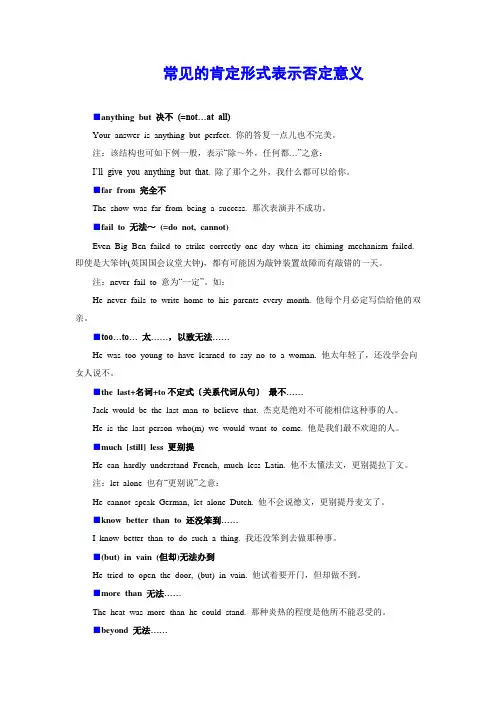
常见的肯定形式表示否定意义■anything but 决不(=not…at all)Your answer is anything but perfect. 你的答复一点儿也不完美。
注:该结构也可如下例一般,表示“除~外,任何都…”之意:I’ll give you anything but that. 除了那个之外,我什么都可以给你。
■far from 完全不The show was far from being a success. 那次表演并不成功。
■fail to 无法~(=do not, cannot)Even Big Ben failed to strike correctly one day when its chiming mechanism failed. 即使是大笨钟(英国国会议堂大钟),都有可能因为敲钟装置故障而有敲错的一天。
注:never fail to 意为“一定”。
如:He never fails to write home to his parents every month. 他每个月必定写信给他的双亲。
■too…to… 太……,以致无法……He was too young to have learned to say no to a woman. 他太年轻了,还没学会向女人说不。
■the last+名词+to不定式〔关系代词从句〕最不……Jack would be the last man to believe that. 杰克是绝对不可能相信这种事的人。
He is the last person who(m) we would want to come. 他是我们最不欢迎的人。
■much [still] less 更别提He can hardly understand French, much less Latin. 他不太懂法文,更别提拉丁文。
注:let alone 也有“更别说”之意:He cannot speak German, let alone Dutch. 他不会说德文,更别提丹麦文了。
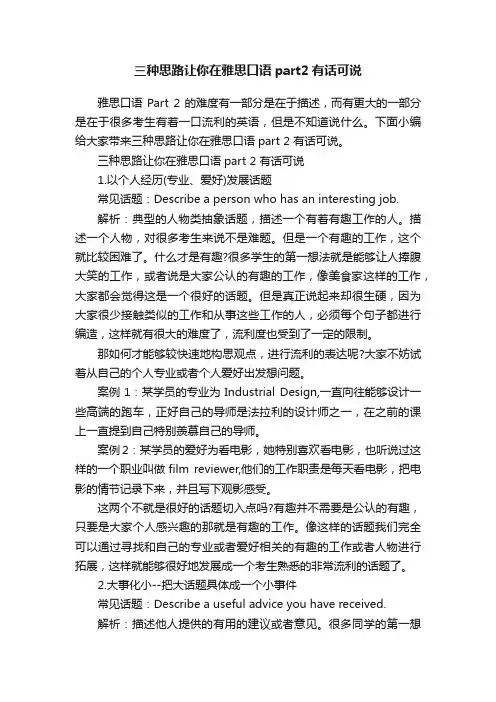
三种思路让你在雅思口语part2有话可说雅思口语Part 2的难度有一部分是在于描述,而有更大的一部分是在于很多考生有着一口流利的英语,但是不知道说什么。
下面小编给大家带来三种思路让你在雅思口语part 2 有话可说。
三种思路让你在雅思口语part 2 有话可说1.以个人经历(专业、爱好)发展话题常见话题:Describe a person who has an interesting job.解析:典型的人物类抽象话题,描述一个有着有趣工作的人。
描述一个人物,对很多考生来说不是难题。
但是一个有趣的工作,这个就比较困难了。
什么才是有趣?很多学生的第一想法就是能够让人捧腹大笑的工作,或者说是大家公认的有趣的工作,像美食家这样的工作,大家都会觉得这是一个很好的话题。
但是真正说起来却很生硬,因为大家很少接触类似的工作和从事这些工作的人,必须每个句子都进行编造,这样就有很大的难度了,流利度也受到了一定的限制。
那如何才能够较快速地构思观点,进行流利的表达呢?大家不妨试着从自己的个人专业或者个人爱好出发想问题。
案例1:某学员的专业为Industrial Design,一直向往能够设计一些高端的跑车,正好自己的导师是法拉利的设计师之一,在之前的课上一直提到自己特别羡慕自己的导师。
案例2:某学员的爱好为看电影,她特别喜欢看电影,也听说过这样的一个职业叫做film reviewer,他们的工作职责是每天看电影,把电影的情节记录下来,并且写下观影感受。
这两个不就是很好的话题切入点吗?有趣并不需要是公认的有趣,只要是大家个人感兴趣的那就是有趣的工作。
像这样的话题我们完全可以通过寻找和自己的专业或者爱好相关的有趣的工作或者人物进行拓展,这样就能够很好地发展成一个考生熟悉的非常流利的话题了。
2.大事化小--把大话题具体成一个小事件常见话题:Describe a useful advice you have received.解析:描述他人提供的有用的建议或者意见。
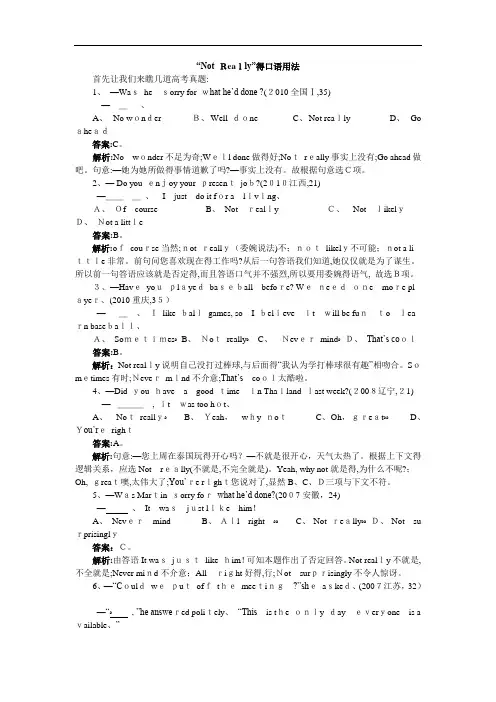
“Not Really”得口语用法首先让我们来瞧几道高考真题:1、—Washesorry for what he’d done ?(2010全国Ⅰ,35)—______、A、No wonder B、Well done C、Not really D、Go ahead答案:C。
解析:No wonder不足为奇;Well done做得好;Notreally事实上没有;Go ahead做吧。
句意:—她为她所做得事情道歉了吗?—事实上没有。
故根据句意选C项。
2、— Do you enjoy your presentjob?(2010江西,21)—______、I just do it for a living、A、Of course B、Notreally C、NotlikelyD、Not a little答案:B。
解析:ofcourse当然;not really(委婉说法)不;notlikely不可能;not a little非常。
前句问您喜欢现在得工作吗?从后一句答语我们知道,她仅仅就是为了谋生。
所以前一句答语应该就是否定得,而且答语口气并不强烈,所以要用委婉得语气, 故选B项。
3、—Haveyouplayedbaseball before? Weneedone more player、(2010重庆,35)—______、Ilike ballgames, so I believeitwill be funtolearn baseball、A、SometimesﻩB、NotreallyﻩC、NevermindﻩD、That’s cool答案:B。
解析:Not really说明自己没打过棒球,与后面得“我认为学打棒球很有趣”相吻合。
Sometimes有时;Nevermind不介意;That’s cool太酷啦。
4、—Did you have a good timein Thailand last week?(2008辽宁,21)— ______, itwas too hot、A、NotreallyﻩB、Yeah,why notC、Oh,greatﻩﻩD、You’reright答案:A。

从互动交际的视角看“really”的话语功能摘要:“really”是人们日常互动交际中出现频率比较高的副词性关联词语。
本文从互动交际的视角出发,分析了“really”在不同交际语境中的话语功能及其它们的共性和差异。
文章指出“really”在口语互动中和在语篇中一样有衔接功能,如表解释和表转折。
与在语篇中不同的是,“really”在口语中常单独成句,尤其是以疑问的形式出现。
文章根据疑问式“really”后是否附加其他内容以及附加内容的差异,分析了“really”不同的话语功能。
此外,“not really”表达一种委婉的否定或拒绝。
本文通过对“really”不同话语功能的分析,希望对英语学习者,尤其是中小学英语学习者提供帮助和指导。
关键词:互动交际“really”话语功能近年来,互动语言学成为语言研究中备受关注的新领域,它充分汲取了功能语言学、会话分析和人类学的理论及其分析方法,并有可能成为二十一世纪语言研究的主流方向之一。
“really”是英语中常用的词汇。
“really”作为副词性关联词语具有四种不同的篇章衔接功能,分别是表示解释,包括补正性解释和确认性解释、表示转折,包括否定性转折和补充性转折。
“really”在口语语体中使用频率较高,但是从互动交际的角度对“really”话语功能的研究并不多见。
本文旨在从互动交际的视角分析“really”的话语功能,以期弥补这方面研究的不足。
一、“really”的话语功能本文语料选取的是青少年喜欢的美国情景喜剧《生活大爆炸》第一、二季的剧本台词。
《生活大爆炸》在全球范围内广受欢迎,尤其是吸引了大量中国年轻观众。
我们结合会话分析的方法,通过对语料中出现的所有“really”用例进行考察,发现“really”作为副词修饰动词或小句的用法居多,其中一部分同时也起到了连接功能,即为副词性关联词语;除此之外,“really”多以单独形式出现,并倾向于呈现疑问的形式。
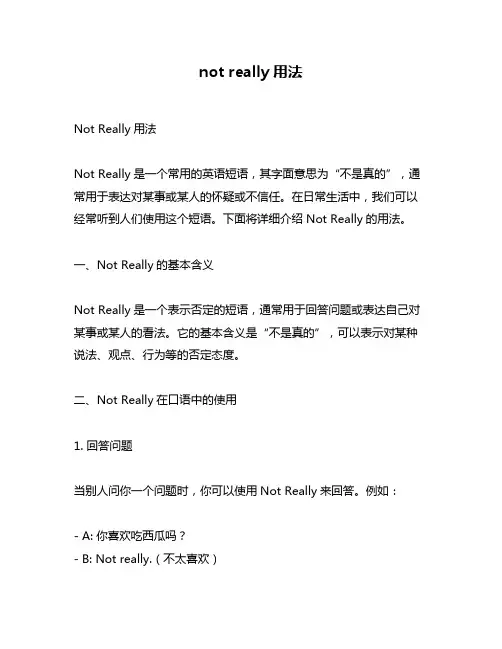
not really用法Not Really用法Not Really是一个常用的英语短语,其字面意思为“不是真的”,通常用于表达对某事或某人的怀疑或不信任。
在日常生活中,我们可以经常听到人们使用这个短语。
下面将详细介绍Not Really的用法。
一、Not Really的基本含义Not Really是一个表示否定的短语,通常用于回答问题或表达自己对某事或某人的看法。
它的基本含义是“不是真的”,可以表示对某种说法、观点、行为等的否定态度。
二、Not Really在口语中的使用1. 回答问题当别人问你一个问题时,你可以使用Not Really来回答。
例如:- A: 你喜欢吃西瓜吗?- B: Not really.(不太喜欢)2. 表达自己对某事或某人的看法如果你对某件事情或某个人持有否定态度,你也可以使用Not Really 来表达自己的看法。
例如:- A: 你觉得这个电影怎么样?- B: Not really my cup of tea.(我不太喜欢这部电影)三、Not Really在书面语中的使用1. 用于文章开头引出话题在文章开头,我们经常使用Not Really来引出话题,表达自己对某个观点或说法的不同看法。
例如:Not really a fan of the current trend of social media influencers, I find their content often lacks substance and authenticity.(我不太喜欢当前社交媒体影响者的趋势,我认为他们的内容经常缺乏实质性和真实性。
)2. 用于转折在文章中,我们也可以使用Not Really来表示转折。
例如:The company claimed to be environmentally friendly, but not really, as it still uses a lot of plastic packaging.(该公司声称是环保的,但实际上并不是,因为它仍然使用很多塑料包装。
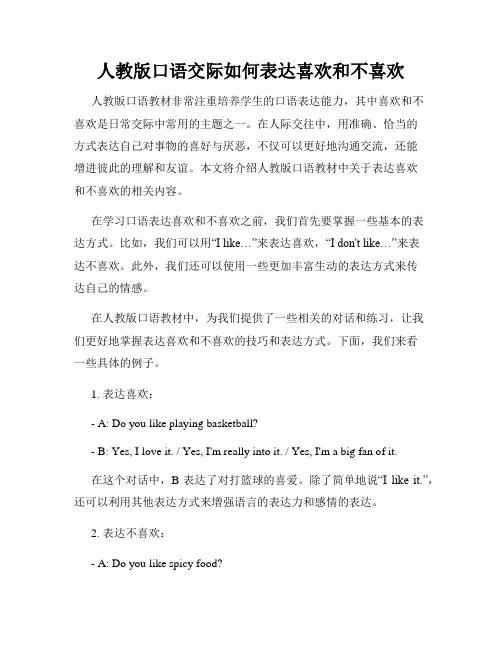
人教版口语交际如何表达喜欢和不喜欢人教版口语教材非常注重培养学生的口语表达能力,其中喜欢和不喜欢是日常交际中常用的主题之一。
在人际交往中,用准确、恰当的方式表达自己对事物的喜好与厌恶,不仅可以更好地沟通交流,还能增进彼此的理解和友谊。
本文将介绍人教版口语教材中关于表达喜欢和不喜欢的相关内容。
在学习口语表达喜欢和不喜欢之前,我们首先要掌握一些基本的表达方式。
比如,我们可以用“I like…”来表达喜欢,“I don't like…”来表达不喜欢。
此外,我们还可以使用一些更加丰富生动的表达方式来传达自己的情感。
在人教版口语教材中,为我们提供了一些相关的对话和练习,让我们更好地掌握表达喜欢和不喜欢的技巧和表达方式。
下面,我们来看一些具体的例子。
1. 表达喜欢:- A: Do you like playing basketball?- B: Yes, I love it. / Yes, I'm really into it. / Yes, I'm a big fan of it.在这个对话中,B表达了对打篮球的喜爱。
除了简单地说“I like it.”,还可以利用其他表达方式来增强语言的表达力和感情的表达。
2. 表达不喜欢:- A: Do you like spicy food?- B: No, I don't like it. / No, I'm not a fan of it. / No, I can't stand it.在这个对话中,B表达了对辣食物的厌恶。
通过使用不同的表达方式,可以更准确地传达自己的感受。
3. 强调喜欢或不喜欢:- A: What's your favorite subject?- B: I absolutely love English. / I really enjoy studying English. / English is my absolute favorite subject.在这个对话中,B强调了自己对英语的喜爱程度。

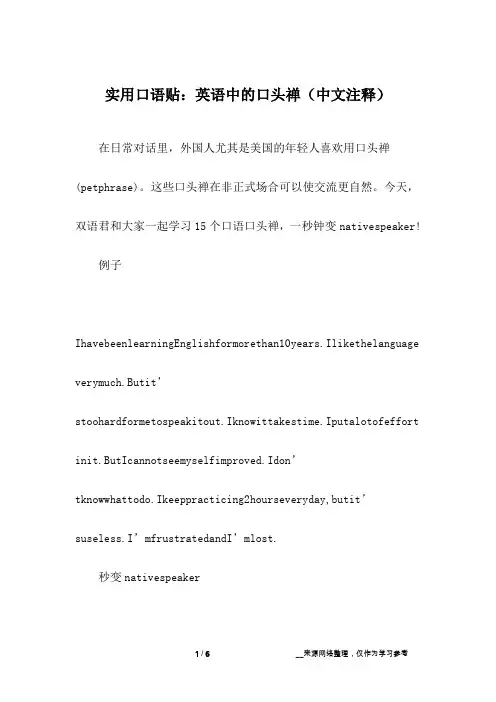
实用口语贴:英语中的口头禅(中文注释)在日常对话里,外国人尤其是美国的年轻人喜欢用口头禅(petphrase)。
这些口头禅在非正式场合可以使交流更自然。
今天,双语君和大家一起学习15个口语口头禅,一秒钟变nativespeaker!例子IhavebeenlearningEnglishformorethan10years.Ilikethelanguage verymuch.Butit’stoohardformetospeakitout.Iknowittakestime.Iputalotofeffort init.ButIcannotseemyselfimproved.Idon’tknowwhattodo.Ikeeppracticing2hourseveryday,butit’suseless.I’mfrustratedandI’mlost.秒变nativespeakerLook!LikeIsaid,IhavebeenlearningEnglishformorethan10years.W ellIlikethelanguageverymuch.Butthepointisthatit'stoohardfor metospeakitout.Iknowittakestime.Here’sthething,Iputalotofeffortinit,butyouknowIcannotseemyselfim proved.YouknowwhatI’msaying?Tobehonest,Idon’treallyknowwhattodo.Letmeputitthisway,ifI’mnotmistaken,Ikeeppracticing2hourseveryday,butit’slikeuseless.Anyway,I’mquitefrustratedandI’mkindalost. 15个黄金口头禅Look:你听我说1Look,Ihavealotofmoney.Idon'tneedyourhelp.你听着,我有很多钱,我不需要你的帮助。
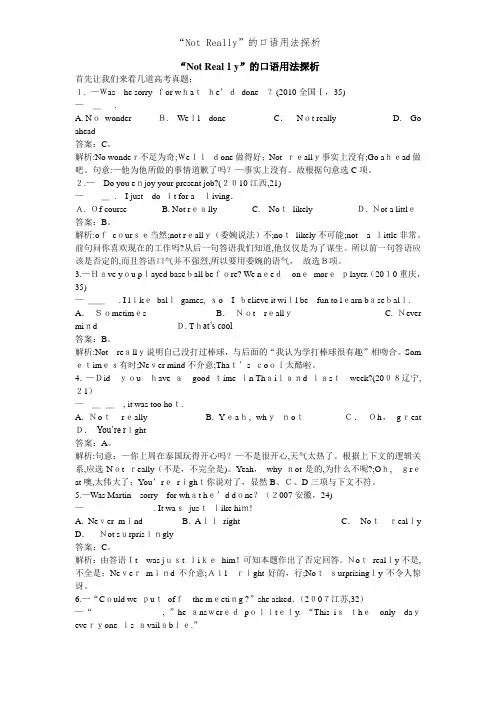
“Not Really”的口语用法探析首先让我们来看几道高考真题:1. —Was he sorry for whathe’ddone?(2010全国Ⅰ,35)—______.A. NowonderB.Well done C.Not really D.Go ahead答案:C。
解析:No wonder不足为奇;Welldone做得好;Not really事实上没有;Go ahead做吧。
句意:—他为他所做的事情道歉了吗?—事实上没有。
故根据句意选C项。
2.—Do you enjoy your present job?(2010江西,21)—______.I just do it for aliving.A. Of course B. Not really C.NotlikelyD. Not a little答案:B。
解析:ofcourse当然;not really(委婉说法)不;notlikely不可能;not a little非常。
前句问你喜欢现在的工作吗?从后一句答语我们知道,他仅仅是为了谋生。
所以前一句答语应该是否定的,而且答语口气并不强烈,所以要用委婉的语气,故选B项。
3.—Have you played baseball before? We needonemoreplayer.(2010重庆,35)—______. I likeballgames, so I believe it will be fun to learn baseball. A.Sometimes B.Not really C. Never mind D. That’s cool答案:B。
解析:Not really说明自己没打过棒球,与后面的“我认为学打棒球很有趣”相吻合。
Som etimes有时;Never mind不介意;That’s cool太酷啦。
4.—Didyouhave agood time in Thailand lastweek?(2008辽宁,21)—______, it was too hot.A. NotreallyB. Yeah, whynotC.Oh,great D.You’re right答案:A。
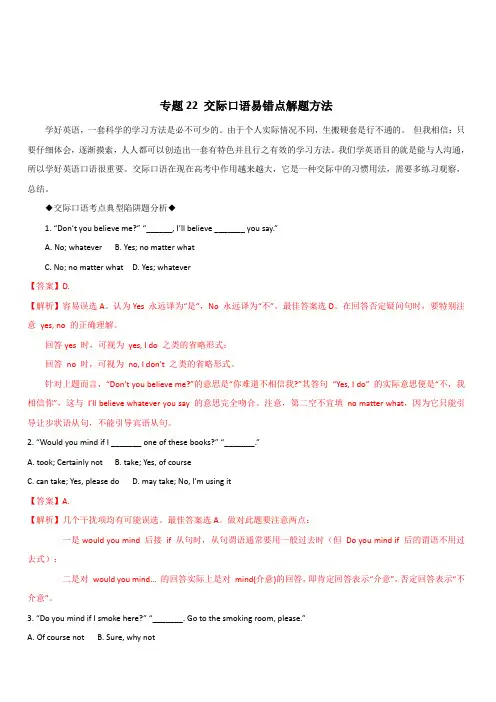
专题22 交际口语易错点解题方法学好英语,一套科学的学习方法是必不可少的。
由于个人实际情况不同,生搬硬套是行不通的。
但我相信:只要仔细体会,逐渐摸索,人人都可以创造出一套有特色并且行之有效的学习方法。
我们学英语目的就是能与人沟通,所以学好英语口语很重要。
交际口语在现在高考中作用越来越大,它是一种交际中的习惯用法,需要多练习观察,总结。
◆交际口语考点典型陷阱题分析◆1. “Don’t you believe me?” “______, I’ll believe _______ you say.”A. No; whateverB. Yes; no matter whatC. No; no matter whatD. Yes; whatever【答案】D.【解析】容易误选A。
认为Yes 永远译为“是”,No 永远译为“不”。
最佳答案选D。
在回答否定疑问句时,要特别注意yes, no 的正确理解。
回答yes 时,可视为yes, I do 之类的省略形式;回答no 时,可视为no, I don’t 之类的省略形式。
针对上题而言,“Don’t you believe me?”的意思是“你难道不相信我?”其答句“Yes, I do” 的实际意思便是“不,我相信你”,这与I’ll believe whatever you say 的意思完全吻合。
注意,第二空不宜填no matter what,因为它只能引导让步状语从句,不能引导宾语从句。
2. “Would you mind if I _______ one of these books?” “_______.”A. took; Certainly notB. take; Yes, of courseC. can take; Yes, please doD. may take; No, I’m using it【答案】A.【解析】几个干扰项均有可能误选。
最佳答案选A。

反问句的例子15个简单反问句在英语中是一个非常常用的语法结构,尤其是在口语中经常被用来表达情态语气以及对某件事或某种说法的怀疑或反驳。
这里我将列出15个简单的反问句例子,希望对正在学习英语的同学有所帮助。
1. “You didn’t really think that was a good idea, did you?” –这个反问句用于表达怀疑和反驳。
重点在于“你没有真的认为那是个好主意吧?”这个质疑性的语气。
2. “Surely you’re not serious.” –这个反问句用于表示惊讶和质疑。
重点在于“你肯定不是认真的吧?”这个语气。
3. “Don’t you think it’s time to go home?” –这个反问句用于建议和请求。
重点在于“你难道不觉得该回家了吗?”这个疑问的语气。
4. “You want to come with me, don’t you?” –这个反问句用于邀请和挑衅。
重点在于“你想跟我一起来吗?”这个疑问的语气。
5. “He’s not really your friend, is he?” –这个反问句用于怀疑和反驳。
重点在于“他不是你的朋友,是吗?”这个质疑性的语气。
6. “You’re not actually going to eat that, are you?” –这个反问句用于表达惊讶和疑虑。
重点在于“你真的要吃那个吗?”这个疑问的语气。
7. “You’re not really suggesting that, are you?” –这个反问句用于表示质疑和反驳。
重点在于“你不是在建议那个吧?”这个质疑的语气。
8. “You don’t really believe that, do you?” –这个反问句用于表达怀疑和反驳。
重点在于“你不认真相信那个吧?”这个质疑的语气。
9. “Surely you can do better than that.” –这个反问句用于表达挑衅和鼓励。
“Not Really”首先让我们来看几道高考真题:1. —Was he sorry for what he’d done ?(2010全国Ⅰ,35)—______.A. No wonderB. Well doneC. Not reallyD. Go ahead答案:C。
解析:No wonder不足为奇;Well done做得好;Not really事实上没有;Go ahead做吧。
句意:—他为他所做的事情道歉了吗?—事实上没有。
故根据句意选C项。
2.— Do you enjoy your present job?(2010江西,21)—______. I just do it for a living.A. Of courseB. Not reallyC. Not likelyD. Not a little答案:B。
解析:of course当然;not really(委婉说法)不;not likely不可能;not a little非常。
前句问你喜欢现在的工作吗?从后一句答语我们知道,他仅仅是为了谋生。
所以前一句答语应该是否定的,而且答语口气并不强烈,所以要用委婉的语气,故选B项。
3.—Have you played baseball before? We need one more player.(2010重庆,35)—______. I like ball games, so I believe it will be fun to learn baseball.A. SometimesB. Not reallyC. Never mindD. That’s cool答案:B。
解析:Not really说明自己没打过棒球,与后面的“我认为学打棒球很有趣”相吻合。
Sometimes有时;Never mind不介意;That’s cool太酷啦。
4.—Did you have a good time in Thailand last week?(2008辽宁,21)— ______, it was too hot.A. Not reallyB. Yeah, why notC. Oh, greatD. You’re right答案:A。
not exactly与not really的口语用法口语表达中的not exactly和not really结构相似,用法也比较接近,尽管在某些特殊情况下可以互换,但在多数情况下仍有较大区别。
一、not exactly的口语用法1. 表示轻微的否定,意为“不很”。
如:He’s not exactly stupid, but he’s too lazy. 他不很蠢,但他太懒了。
He’s not exactly angry—he’s just acting. 他倒不是真生气——只是装装样子罢了。
He’s not exactly nice-looking, and yet he has enormous charm. 他并不十分好看,可是他很有魅力。
2. 表示不完全否定,意为“不完全是”“不完全如此”“不全对”。
如:A:Do you mean to say he’ll refuse us? 你的意思是说他会拒绝我们?B:Not exactly. 不完全如此。
A:So you missed the meeting. 所以你就错过了这次会议。
B:Not exactly. I got there five minutes beforeit finished. 不完全是这样,我在散会前五分钟赶到了那儿。
3. 表示语气很强的否定,意为“绝不”“一点也不”。
如:A:You look very tired. Did you sleep at all last night? 你看上去很疲倦的样子,你昨晚没睡觉吗?B:No, not really. I’m tired out now. 没有,一点没睡。
我现在已是筋疲力尽了。
二、not really的口语用法1. 表示轻微的否定,意为“不很”。
如:A:Are you busy now? 你现在忙吗?B:Oh, not really. Why? 哦,不怎么忙,有什么事?A:Do you want to come along? 你想同我们一起去吗?B:Not really. 不很想去。
NOT美式地道口語我想大家都知道, 說話和寫文章是有很大的不同的, 說話講求的是能夠清楚地表達自己的意思, 因此在用字上要力求簡單扼要, 但重點部份要強調出來. 所以說話時也是跟女人穿的裙子一樣, 越短越好, 該露的地方要露, 不該露的地方就不要露. 你能夠清楚地掌握這個重點嗎? 現在讓我來考考你, 如果有人問你, "did you break this plate?" 你要強調這不是我幹的, 你會怎麽說? 你會不會說, "no, i didn't." 但是要注意喔! "no, i didn't" 只是說, "我沒有作" 這跟 "不是我幹的" 有很大的差別喔.. 那正確的說法應該是怎樣? 讓我們來看看這一集, not 的用法.1. not me.不是我.嘿... 沒想到這麽簡單吧! 這種看似簡單, 文法也不對的句子, 卻是老美天天挂在嘴邊的話. 這句話簡單明瞭, 而且把重點 "不是我" 給強調出來. 這是非常好的一個句子. 記得昨天去看新出來的電影 007, the world is not enough. 當 james bond 開始在懷疑石油大王的女兒 ( sophie marceau )是否一手自導自演這整出戲時, 她就說了這一句, "not me" 另外, 老美也很喜歡講 "wasn't me." 這跟 "not me." 都是一樣的意思, 同樣強調這不是我幹的.還有像以前大家很流行機車聯誼, 結果很不幸你的鑰匙被恐龍給抽中了, 你就可以望天長歎說, "oh, not me." (怎麽會是我呢?) 或是你也可以說, "why me?"2. not today.不要今天啦.這種用法常常用在二個人相約時間的時候. 例如有人找你去看電影, "do you want to go to see the movie?" 你就可以說, "oh, not today" 這表示出你還是蠻想去的, 只不過今天不行. 另外 "not at this moment." 或是 "not now." 也蠻常用的, 例如有時候我煮了一些東西要請我的室友吃, 他就會說, "thanks, but not at this moment."3. not a word.保持安靜."not a word" 跟 "be quite." 一樣都是要別人安靜下來的意思. 例如你跟朋友去看電影, 結果電影都開演了, 你的朋友還在嘰嘰喳喳講個不停, 這時候你就可以跟他說, "shhhhhhh. not a word." 或是 "be quite." 要是你真的已經很煩了,就說 "shut up!"4. not so fast.不要那麽快啦.有些男女朋友第一次約會就牽牽手, 第二次就親親嘴, 第三次就點點點, 如果你是女生, 覺得這樣子實在是太快了, 你就可以說, "hey, not so fast." 同樣的, 有些男生去陪女朋友就像例行公事一樣, 隨便敷衍個二句就想走人, 這時女生就可以說, "not so fast."5. not a chance.一點機會也沒有.這句話根 "you don't have any chance" 是一樣的, 都是表示根本就沒有機會. 例如比賽前別人問你, "can we beat them?" 你就可以說, "not a chance"跟 not a chance 意思相當的句子有很多, 例如 "not really", "not in a million years", "not in my life time" 或是 "not in your life time" 例如你要跟朋友去打球, 你朋友說, "you man. i'm gonna kick your ass!" 你就可以說, "in your dream, pal! not in your life time" 意思就是, 作你的大頭夢去吧! 我看在你的有生之年是不可能了!6. not at all.一點也不.這句話通常是用來回答別人的問題, 例如別人問你, "do you like american food?" 你就可以回答 "not at all". 這句話強調出一點也不喜歡. 如果只說 "no, i don't like it." 可能多少還會吃一點, 可是 "not at all" 可能就是連吃都不會想去吃了, 算是全部否定對方的回答.如果是部份否定的話, 你可以說 "not really" 表示你不全然同意對方所說的話. 像是同樣如果別人問你, "do you like american food?" 你說 "not really." 就表示出你不是那麽喜歡.7. not good enough.還不夠好.這句話是專門用來挑剔別人用的. 例如小孩考了八十分就很興奮地跑去跟父母說, "i got 80 in the test!" 他父母如果是那種比較嚴苛一點的人的話, 可能就會說, "not good enough." 或是你也可以潑別人冷水, 例如別人說, "that book is awesome!" 你就可以回他一句, "not good enough for me."這句話昨天的 007 電影中也有聽到, 就是當 sophie marceau 所飾演的 electro king 問 james bonds, "who's trying to kill me?" james bond 說, "i don't know." 這時 sophie marceau 就回了他一句, "not good enough." 意思當然就是我對你這樣的表現十分不滿意啦!8. not again不會再來一次吧.當有什麽倒楣事第一次發生時, 你可以笑笑地說 bad luck 或是 rotten luck. 但是當第二次又接著發生了, 你大概就會說, "shxx! not again" (這個 shxx! 是你所罵的髒話, 暫時把它消音). 例如車子爆胎了, 你剛拿去補完才出汽車修理店門口又被一根鐵釘刺到, 我想任何正常人的反應一定都是 shxx! not again 吧!另外有些初生之犢不畏虎跑去高空彈跳 (bumgee jump) 結果這一跳膽子差點沒嚇破. 要是這時別人找你再跳一次, 你就可以跟他說, "not again!" 或是我也聽過 "you have pay me to do it again."9. not possible.不可能.這個 not possible 跟 impossible 是一樣的意思. 可是就算有了 impossible 這個字, 很多老美還是喜歡說 not possible. 可能是這個 not 比較能強較出 "不"的意思吧! 例如有人問你可不可以在半小時內到某地會面, 你就可以說, "not possible, it's rush hour now."10. not a soul in sight.半個人影也沒有.這句話算是固定的用法. soul 在這裏就是指人而言. 記得有一次跟老美出去爬山, 只見一望無際的森林, 適逄當時有一部很紅的電影 blair witch project 講得也是三個大學生在森林裏面迷路的故事, 大家走到後來心裏都毛毛的, 因爲半個人影也沒有, 有一個老美就說了這一句, "not a soul in sight."如果講的不是人而是其他的東西的話, 則用 "not a thing." 例如別人問你, "did you see anything in the bush?" 要是你什麽也沒看到, 你就可以回答, "not a thing."生活小故事現在美國已經是十二月初, 時節已經正式進入冬季, 晚上睡覺時如果不開暖氣的話還蠻冷的. 我有一個韓國同學最近剛搬家, 結果暖氣還沒修好, 早上一來學校冷得直發抖, 跟我們說 "my heater is down. i am freezing." 結果系上的一個教授就開玩笑地問他, "how about your wife?" 結果那位韓國同學笑笑地說, "i held her all night." 原來老婆還有 "懷爐" 的功用, 我現在才知道.。
“Not Really”的口语用法首先让我们来看几道高考真题:1. —Was he sorry for what he’d done ?(2010全国Ⅰ,35)—______.A. No wonderB. Well doneC. Not reallyD. Go ahead答案:C。
解析:No wonder不足为奇;Well done做得好;Not really事实上没有;Go ahead做吧。
句意:—他为他所做的事情道歉了吗?—事实上没有。
故根据句意选C项。
2.— Do you enjoy your present job?(2010江西,21)—______. I just do it for a living.A. Of courseB. Not reallyC. Not likelyD. Not a little答案:B。
解析:of course当然;not really(委婉说法)不;not likely不可能;not a little非常。
前句问你喜欢现在的工作吗?从后一句答语我们知道,他仅仅是为了谋生。
所以前一句答语应该是否定的,而且答语口气并不强烈,所以要用委婉的语气,故选B项。
3.—Have you played baseball before? We need one more player.(2010重庆,35)—______. I like ball games, so I believe it will be fun to learn baseball.A. SometimesB. Not reallyC. Never mindD. That’s cool答案:B。
解析:Not really说明自己没打过棒球,与后面的“我认为学打棒球很有趣”相吻合。
Sometimes有时;Never mind不介意;That’s cool太酷啦。
4.—Did you have a good time in Thailand last week?(2008辽宁,21)— ______, it was too hot.A. Not reallyB. Yeah, why notC. Oh, greatD. You’re right答案:A。
解析:句意:—你上周在泰国玩得开心吗?—不是很开心,天气太热了。
根据上下文的逻辑关系,应选Not really(不是,不完全是)。
Yeah, why not是的,为什么不呢?;Oh, great 噢,太伟大了;You’re right你说对了,显然B、C、D三项与下文不符。
5.—Was Martin sorry for what he’d done?(2007安徽,24)—. It was just like him!A. Never mindB. All rightC. Not reallyD. Not surprisingly答案:C。
解析:由答语It was just like him!可知本题作出了否定回答。
Not really不是,不全是;Never mind不介意;All right好的,行;Not surprisingly不令人惊讶。
6.—“Could we put off the meeting ?”she asked.(2007江苏,32)—“, ”he answered politely. “This is the only day everyone is available.”A. Not likelyB. Not exactlyC. Not nearlyD. Not really答案:D。
解析:由句意可知D项正确,表示委婉说不,意为“真得不行”。
Not likely不可能;Not exactly不完全是;Not nearly几乎不。
7.—Have you been wasting time on computer games again?(2007山东,23)—.I’ve been study ing a lot and I need a break.A. No wayB. Not reallyC.I don’t agreeD.I couldn’t agree more答案:B。
解析:由下一句“我一直在学习,而且需要休息”可知,此处应是“我真的不是在浪费时间玩电脑游戏”。
故选B项,表示语气很强的否定,意为“真的没有”、“的确没有”。
No way 没门;I don’t agree不同意;I couldn’t agree more完全同意。
【用法归纳点拨】从上面的几道高考真题分析来看,短语“Not really”已经成为近几年高考情景交际类试题的重要考点和热点之一。
现将“Not really”的常见口语用法归结如下:1.表示轻微的否定,意为“不很”、“不十分”、“不完全是”等。
例如:1)—Are you busy now? 你现在忙吗?—Oh, not really. Why? 哦,不怎么忙,有什么事?—Do you want to come along? 你想同我们一起去吗?—Not really. 不很想去。
2)—He tried to explai n it to me but I just couldn’t understand. Do you?他设法给我解释,可我就是听不懂,你懂吗?—Not really. 不很懂。
2.表示怀疑或不相信,意为“不会吧”、“不见得”、“不会是真的吧”等。
例如:3)—He’s leaving tomorrow. 他明天就要走了。
—Not really. 不会吧。
4)—They got married last month. 他们上个月结婚了。
—Not really. 不会是真的吧!3.表示语气很强的否定,意为“真的没有”、“的确没有”、“事实上没有”等。
例如:5)—Did you watch the news on TV last night? 你昨天晚上看电视新闻了吗?—Not really. 确实没有。
6)—You look very tired. Did you sleep at all last night?你看上去很疲倦的样子,你昨晚没睡觉吗?—No, not really. I’m tired out now.没有,一点没睡。
我现在已是筋疲力尽了。
【经典好句赏析】“Not really”常用来修饰形容词、副词、动词或全句。
现从《句酷网》摘选一些含有not really 的英文句子以飨读者。
1. You shall not really be walking on the lawn.你真不该在草坪上散步。
2. He’s not really an outdoor type.他算不上是喜爱户外活动的人.3. Sometimes an ordinary person is not really ordinary.俗人有时不俗。
4. She’s not really crying. She’s only acting to get your sympathy.她不是真哭,她只是装哭来取得你们的同情。
5. I'm not really hungry—I’ll just have some crackers.我真的不饿—我就吃几块饼干吧。
6. I am not really familiar with the local laws实际上我对当地的法律并不熟7. I don’t know what I want. I’m not really a drinker.我不知道要什么好,我不会喝酒。
8. I cannot believe the time have come to say goodbye. I am not really sure I want to leave.我不能相信已经是分别的时候了。
我真不知道我是不是要离开。
9. He’ s not really angry —he’ s just acting ( the stern father ).他倒不是真生气—只是装装(严父的)样子罢了。
10. He is not really hurt; he is only kidding.他没真的受伤,他只是开玩笑。
11. The movies flatter him—he’s not really that handsome.电影使他显得漂亮—他实际上没有那么英俊。
12. There was not really much difference in their points of view.他们的观点没有多大的不同。
13. He spoke for a long time but his meaning did not really come across.他讲了很长时间, 但他的意思没有人真正理解。
14. I was disappointed but not really surprised.我深感失望,但是确实不感到惊奇。
15. Most people who enjoy movies do not really care how they are made.多数电影爱好者并不在意电影是如何制作的。
16. I do not really believe his ability to get off this stain .我真不相信他有本事去掉这个污渍。
【巩固提升训练】1. —Do you understand what I mean?—______. I’m a bit lost.A. Not at allB. Not yetC. Not reallyD. Nothing doing2. —So you gave her your Walkman?—______, I lent it to her.A. Not exactlyB. Not halfC. No problemD. No worry3. — Could we put off the meeting?— ______. This is the only day everyone is available.A. Not likelyB. Not exactlyC. Not nearlyD. Not really4. —Do you want to go to the movie, Jane?—______. I feel like doing something different.A. Don’t mention itB. I don’t want itC. I don’t think soD. Not really5. —So you missed the meeting.—______. I got there five minutes before it finished.A. Not at allB. Not exactlyC. Not especiallyD. Not really6. — Are you a Beijinger?— ________. I was born in Henan. I came to Beijing when I was ten and have livedhere ever since.A. ExactlyB. No actuallyC. Just so-soD. Not really7. —Do you think you could do without help?—______. This is not the first time for me.A. Take careB. Hurry upC. Don’t worryD. Not exactly8. 一Jay Chou held a successful concert yesterday evening!一!It co uldn’t have been better.A. ExactlyB. ReallyC. Not reallyD. Not at all9. —Thank you for your MP4 player. I’ll get Mary to take it to you soon.—_______. I’ve bought a new one.A. No senseB. No hurryC. No wayD. No use10. —Have you finished your first paper?—______. Just half of it. How about you?A. Not yetB. Not likelyC. Not a bitD. Not at all11. —I can’t repair these until tomorrow, I’m afraid.—That’s OK, there’s .A. no problemB. no wonderC. no doubtD. no hurry12. —Dad! Tom’s broken a glass!—.Accidents will happen.A. No wayB. Doesn’t matterC. No trouble at allD. Don’t mention it13. —I’m dead tired. I can’t walk any farther, Jenny.—, Tommy. You can do it!A. No problemB. No hurryC. Come onD. That’s OK14. —Would she mind playing against her former teammates?—She is willing to play against any tough players.A. I think so.B. I’m not surprised.C. Of course.D. Not likely!15. —Shall I lock the lab before I go home?—________. I’ll cheek it myself later.A. Go aheadB. Don’t botherC. No hurryD. No problemKeys:1-5 CADDB 6-10DCABA 11-15 DBCDB。